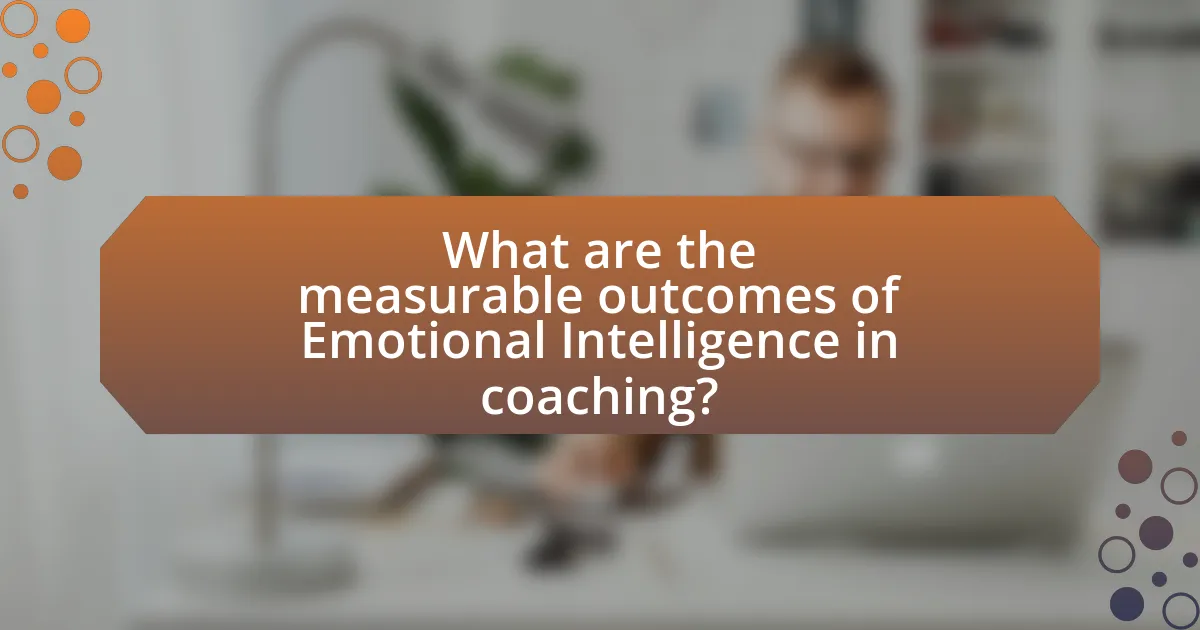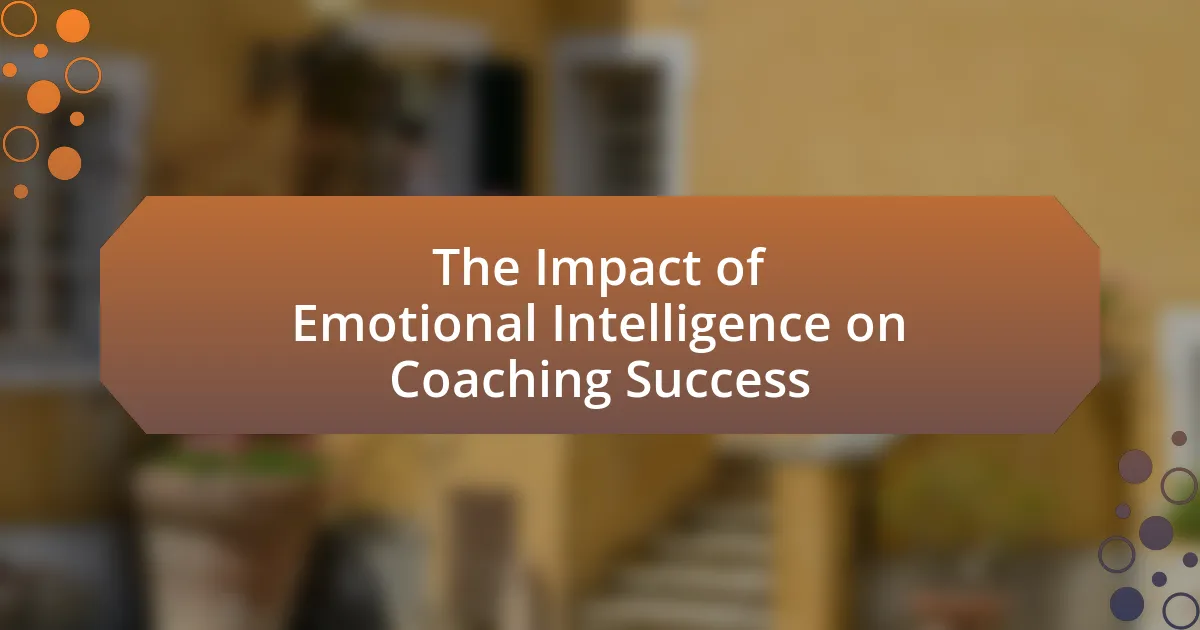The article examines the significant impact of emotional intelligence on coaching success, highlighting how it enables coaches to understand and manage their own emotions while effectively recognizing and influencing their clients’ emotions. Key components of emotional intelligence, such as self-awareness, empathy, and relationship management, are discussed in relation to their influence on coaching effectiveness and client engagement. The article also explores measurable outcomes of emotional intelligence in coaching, including improved communication, conflict resolution, and client satisfaction, while addressing the challenges faced by coaches lacking these skills. Strategies for developing emotional intelligence, such as mindfulness practices and active listening techniques, are presented as essential for enhancing coaching effectiveness and fostering positive client relationships.

What is the Impact of Emotional Intelligence on Coaching Success?
Emotional intelligence significantly enhances coaching success by enabling coaches to understand and manage their own emotions while effectively recognizing and influencing the emotions of their clients. This ability fosters stronger relationships, improves communication, and facilitates a supportive environment conducive to growth. Research indicates that coaches with high emotional intelligence can better motivate their clients, leading to improved performance outcomes. For instance, a study published in the “Journal of Applied Psychology” found that emotional intelligence in leadership correlates with better team dynamics and increased productivity, underscoring its importance in coaching contexts.
How does Emotional Intelligence influence coaching effectiveness?
Emotional Intelligence significantly enhances coaching effectiveness by enabling coaches to understand and manage their own emotions while also empathizing with their clients’ feelings. This understanding fosters a supportive environment that encourages open communication and trust, which are essential for effective coaching. Research indicates that coaches with high Emotional Intelligence can better recognize emotional cues, leading to more tailored and impactful coaching strategies. For instance, a study published in the Journal of Applied Psychology found that leaders with higher Emotional Intelligence were more successful in motivating their teams, which parallels the coaching dynamic where motivation is crucial for client progress.
What are the key components of Emotional Intelligence relevant to coaching?
The key components of Emotional Intelligence relevant to coaching are self-awareness, self-regulation, social awareness, and relationship management. Self-awareness allows coaches to understand their own emotions and how these affect their coaching style and interactions. Self-regulation enables coaches to manage their emotions, leading to more thoughtful responses rather than reactive behaviors. Social awareness helps coaches to empathize with their clients, understanding their emotional states and needs. Relationship management involves the ability to inspire, influence, and develop others, fostering a positive coaching environment. Research by Goleman (1995) highlights that these components significantly enhance interpersonal effectiveness, which is crucial for successful coaching outcomes.
How do these components enhance a coach’s ability to connect with clients?
Emotional intelligence components, such as self-awareness, empathy, and social skills, enhance a coach’s ability to connect with clients by fostering trust and understanding. Self-awareness allows coaches to recognize their own emotions and biases, enabling them to respond more effectively to clients’ needs. Empathy helps coaches to understand clients’ perspectives and feelings, creating a supportive environment that encourages open communication. Social skills facilitate the establishment of rapport and effective interaction, which are crucial for building strong client relationships. Research indicates that high emotional intelligence in coaches correlates with improved client satisfaction and engagement, demonstrating the importance of these components in successful coaching dynamics.
Why is Emotional Intelligence critical for successful coaching?
Emotional Intelligence is critical for successful coaching because it enables coaches to understand and manage their own emotions while also empathizing with their clients’ feelings. This understanding fosters a strong coach-client relationship, which is essential for effective communication and trust-building. Research indicates that high Emotional Intelligence in coaches correlates with improved client outcomes, as it allows coaches to tailor their approaches to meet individual needs, thereby enhancing motivation and engagement. For instance, a study published in the “International Journal of Evidence Based Coaching and Mentoring” found that coaches with higher Emotional Intelligence reported greater success in facilitating client growth and achieving desired results.
What role does self-awareness play in a coach’s performance?
Self-awareness significantly enhances a coach’s performance by enabling them to understand their own emotions, strengths, and weaknesses, which directly influences their coaching effectiveness. Coaches who possess high self-awareness can better manage their emotional responses, leading to improved decision-making and communication with athletes. Research indicates that self-aware coaches are more adept at recognizing the emotional states of their players, fostering a supportive environment that enhances team dynamics and performance. For instance, a study published in the Journal of Applied Sport Psychology found that coaches with higher self-awareness reported better relationships with their athletes, which correlated with improved team outcomes.
How does empathy contribute to building trust in coaching relationships?
Empathy significantly contributes to building trust in coaching relationships by fostering a deeper understanding between the coach and the client. When a coach demonstrates empathy, they validate the client’s feelings and experiences, creating an environment where the client feels safe to express themselves openly. This emotional connection enhances the client’s perception of the coach as trustworthy and supportive. Research indicates that empathetic communication leads to stronger relational bonds; for instance, a study published in the Journal of Applied Psychology found that leaders who exhibit empathy are perceived as more trustworthy, which directly correlates with improved team performance and satisfaction. Thus, empathy not only strengthens the relationship but also facilitates effective coaching outcomes.

What are the measurable outcomes of Emotional Intelligence in coaching?
Measurable outcomes of Emotional Intelligence in coaching include improved communication skills, enhanced conflict resolution abilities, increased self-awareness, and better stress management. Research indicates that coaches with high Emotional Intelligence can foster stronger relationships with clients, leading to higher satisfaction and engagement levels. For instance, a study published in the Journal of Applied Psychology found that leaders with higher Emotional Intelligence had teams that performed 20% better in terms of productivity and morale. Additionally, Emotional Intelligence training has been shown to increase emotional regulation, which correlates with a 30% improvement in coaching effectiveness as measured by client feedback and performance metrics.
How can we assess the impact of Emotional Intelligence on coaching results?
To assess the impact of Emotional Intelligence on coaching results, one can utilize quantitative measures such as pre- and post-coaching assessments, including standardized Emotional Intelligence tests and performance metrics. Research indicates that higher Emotional Intelligence correlates with improved coaching outcomes, as evidenced by a study published in the Journal of Applied Psychology, which found that coaches with higher Emotional Intelligence ratings led to greater athlete performance improvements. Additionally, qualitative feedback from coachees can provide insights into how Emotional Intelligence influences their development and satisfaction with coaching.
What metrics are used to evaluate coaching success linked to Emotional Intelligence?
Metrics used to evaluate coaching success linked to Emotional Intelligence include self-assessment surveys, 360-degree feedback, performance metrics, and emotional intelligence assessments. Self-assessment surveys allow individuals to reflect on their emotional competencies, while 360-degree feedback provides insights from peers, subordinates, and supervisors, offering a comprehensive view of emotional intelligence in practice. Performance metrics, such as goal achievement and productivity levels, can indicate the effectiveness of coaching interventions. Emotional intelligence assessments, like the Emotional Quotient Inventory, quantitatively measure emotional skills and competencies, providing a baseline for evaluating coaching outcomes. These metrics collectively help in determining the impact of emotional intelligence on coaching success.
How do client satisfaction and progress reflect a coach’s Emotional Intelligence?
Client satisfaction and progress are direct indicators of a coach’s Emotional Intelligence, as they demonstrate the coach’s ability to understand and manage emotions effectively. A coach with high Emotional Intelligence can empathize with clients, fostering a trusting relationship that enhances communication and motivation. Research shows that emotionally intelligent coaches are better at recognizing clients’ emotional states, which allows them to tailor their coaching strategies to meet individual needs, leading to higher satisfaction and measurable progress. For instance, a study published in the “International Journal of Evidence Based Coaching and Mentoring” by Grant and Cavanagh (2011) found that clients reported greater satisfaction and achieved better outcomes when coached by individuals with higher Emotional Intelligence. This correlation underscores the importance of Emotional Intelligence in achieving successful coaching relationships.
What challenges do coaches face without Emotional Intelligence?
Coaches without Emotional Intelligence face significant challenges in effectively managing team dynamics and fostering player development. The lack of Emotional Intelligence leads to difficulties in understanding and responding to the emotional needs of athletes, which can result in poor communication and conflict resolution. Research indicates that coaches lacking this skill may struggle to build trust and rapport with their players, ultimately hindering team cohesion and performance. For instance, a study published in the Journal of Sports Sciences highlights that coaches with high Emotional Intelligence are more successful in motivating athletes and enhancing their overall performance, demonstrating the critical role of Emotional Intelligence in coaching effectiveness.
How does a lack of Emotional Intelligence affect client engagement?
A lack of Emotional Intelligence negatively impacts client engagement by hindering effective communication and relationship-building. When coaches or service providers lack the ability to recognize and manage their own emotions, as well as those of their clients, they struggle to create a trusting and empathetic environment. This can lead to misunderstandings, decreased client satisfaction, and ultimately, lower retention rates. Research indicates that high Emotional Intelligence correlates with better client relationships, as it fosters an atmosphere of understanding and support, which is essential for successful coaching outcomes.
What are the consequences of poor emotional regulation in coaching?
Poor emotional regulation in coaching leads to ineffective communication and diminished trust between coach and athlete. When coaches struggle to manage their emotions, they may react impulsively, which can create a hostile environment and negatively impact athlete performance. Research indicates that emotional dysregulation can result in increased stress levels for both coaches and athletes, ultimately hindering team cohesion and motivation. Furthermore, a study published in the Journal of Applied Sport Psychology found that coaches with low emotional regulation skills often experience higher turnover rates, as their inability to maintain composure can lead to burnout and dissatisfaction in their roles.

How can coaches develop their Emotional Intelligence?
Coaches can develop their Emotional Intelligence by engaging in self-reflection, seeking feedback, and practicing empathy. Self-reflection allows coaches to understand their emotions and reactions, which is essential for emotional awareness. Seeking feedback from peers and clients helps coaches identify areas for improvement and enhances their interpersonal skills. Practicing empathy involves actively listening and understanding the emotions of others, which fosters stronger relationships and communication. Research indicates that high Emotional Intelligence is linked to better coaching outcomes, as it enables coaches to connect with athletes on a deeper level, leading to improved performance and satisfaction.
What strategies can enhance a coach’s Emotional Intelligence?
To enhance a coach’s Emotional Intelligence, strategies such as self-awareness training, active listening, and empathy development can be implemented. Self-awareness training helps coaches recognize their own emotions and triggers, which is foundational for emotional regulation. Active listening fosters better communication and understanding of athletes’ feelings, leading to stronger relationships. Empathy development allows coaches to connect with athletes on a deeper level, improving motivation and trust. Research by Goleman (1995) emphasizes that these components of Emotional Intelligence are critical for effective leadership and coaching success, as they directly influence team dynamics and performance outcomes.
How can mindfulness practices improve Emotional Intelligence in coaching?
Mindfulness practices can enhance Emotional Intelligence in coaching by fostering self-awareness and emotional regulation. These practices encourage coaches to be present and attentive, allowing them to recognize their own emotions and those of their clients more effectively. Research indicates that mindfulness training can lead to significant improvements in emotional regulation, empathy, and interpersonal relationships, which are critical components of Emotional Intelligence. For instance, a study published in the Journal of Occupational Health Psychology found that mindfulness practices increased emotional awareness and reduced emotional reactivity among participants, thereby enhancing their ability to manage emotions in coaching scenarios. This improvement in Emotional Intelligence ultimately contributes to more effective coaching outcomes.
What role does feedback play in developing Emotional Intelligence skills?
Feedback is crucial in developing Emotional Intelligence skills as it provides individuals with insights into their emotional responses and interpersonal interactions. By receiving constructive feedback, individuals can identify areas for improvement in self-awareness, self-regulation, empathy, and social skills, which are core components of Emotional Intelligence. Research indicates that feedback enhances learning and adaptation; for instance, a study by Kluger and DeNisi (1996) found that feedback significantly improves performance by helping individuals understand their emotional triggers and responses in various situations. This process fosters a deeper understanding of oneself and others, ultimately leading to improved emotional competencies essential for effective coaching and interpersonal relationships.
What best practices should coaches follow to leverage Emotional Intelligence?
Coaches should prioritize self-awareness, empathy, and effective communication to leverage Emotional Intelligence. Self-awareness allows coaches to recognize their own emotions and biases, which enhances their ability to connect with athletes. Empathy enables coaches to understand and respond to the emotional needs of their athletes, fostering a supportive environment. Effective communication ensures that coaches can convey their messages clearly while being receptive to feedback. Research by Goleman (1995) highlights that leaders with high Emotional Intelligence can improve team performance and cohesion, demonstrating the importance of these practices in coaching success.
How can active listening techniques enhance coaching effectiveness?
Active listening techniques enhance coaching effectiveness by fostering deeper understanding and trust between the coach and the client. When coaches actively listen, they demonstrate empathy and validation, which encourages clients to express their thoughts and feelings more openly. Research indicates that effective communication, including active listening, can lead to improved client outcomes, as it allows coaches to tailor their strategies to meet individual needs. For instance, a study published in the Journal of Coaching Psychology found that coaches who employed active listening techniques reported higher levels of client satisfaction and engagement, ultimately leading to more successful coaching relationships.
What are the benefits of fostering a growth mindset in coaching sessions?
Fostering a growth mindset in coaching sessions enhances resilience, motivation, and learning outcomes for individuals. This mindset encourages participants to view challenges as opportunities for growth rather than obstacles, leading to increased engagement and persistence in the face of difficulties. Research by Dweck (2006) indicates that individuals with a growth mindset are more likely to embrace feedback and learn from criticism, which directly contributes to improved performance and skill development. Additionally, a growth mindset fosters a collaborative environment where individuals support each other’s learning journeys, further enhancing the overall effectiveness of coaching sessions.
What practical tips can coaches implement to improve their Emotional Intelligence?
Coaches can improve their Emotional Intelligence by actively practicing self-awareness, empathy, and effective communication. Self-awareness involves regularly reflecting on one’s emotions and reactions, which can be enhanced through journaling or mindfulness exercises. Empathy can be developed by actively listening to athletes and understanding their perspectives, fostering a supportive environment. Effective communication skills can be sharpened by seeking feedback from peers and athletes, allowing coaches to adjust their approach based on the emotional needs of their team. Research indicates that high Emotional Intelligence in coaches correlates with better team performance and athlete satisfaction, highlighting the importance of these practical tips.
